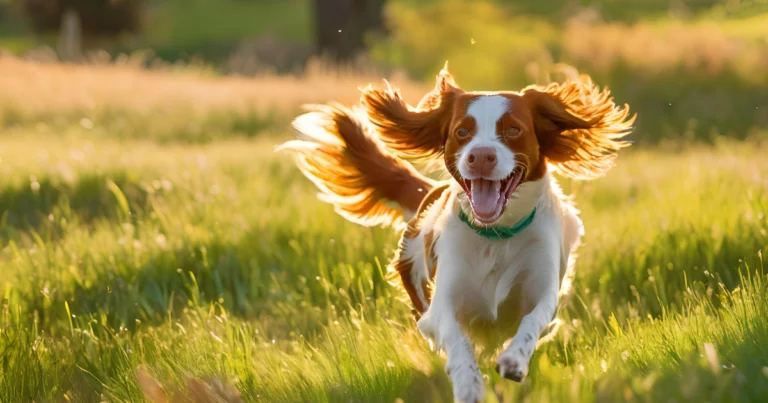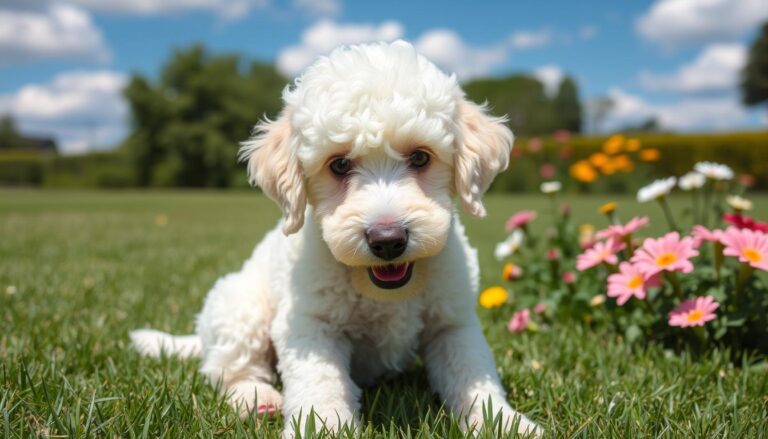What Are Miniature Labradors? Size, Traits, and Care Explained
There’s a growing interest in smaller dog breeds, and the Miniature Labrador is a favorite. These small dogs, also called “Mini Labs,” have won many hearts. They are perfect for those looking for a small dog to be their companion. But what makes Miniature Labradors different from the standard size? Let’s dive into their size, traits, and care needs.
Miniature Labradors, or Mini Labrador Retrievers, are not a new breed. They are just a smaller version of the Labrador Retriever. These dogs are smaller in height and weight than the standard Labrador. They share many traits with their larger cousins but have their own special qualities.
They are great for people living in small spaces or with little outdoor area. Their small size doesn’t take away from their friendly, smart, and adaptable nature. It’s important for future owners to understand these dogs’ needs to give them the best care.
Table of Contents
Key Takeaways
- They are a size variation of the Labrador Retriever breed, not a separate breed.
- They are typically smaller in stature, with a height and weight below the standard Labrador Retriever specifications.
- Theys share many of the same characteristics as their larger counterparts, including friendliness, intelligence, and adaptability.
- The compact size of them makes them an appealing option for those with limited living spaces or outdoor access.
- Proper care and understanding of the unique needs of Miniature Labradors are crucial for prospective owners.
Understanding Miniature Labradors: Myth vs. Reality
Dog lovers are increasingly interested in miniature labrador puppies and toy labradors. But, it’s key to know the truth from the myths about these smaller Labradors. Let’s explore the facts and the ethical sides of their breeding.
Common Misconceptions About Mini Labs
Many think teacup labradors are a real breed. But, they’re not officially recognized. They’re made by breeding dogs to be smaller, which can harm their health.
The Truth Behind Smaller-Sized Labradors
It’s true some Labradors are naturally smaller. But, the idea of “teacup” or “miniature” Labradors is mostly a marketing trick. These dogs often face health problems due to bad breeding practices. Good breeders aim to keep the breed healthy and at a standard size.
Natural vs. Artificial Breeding Methods
- Natural variation in Labrador size can occur, but these dogs are still within the breed’s standard range.
- Artificially breeding Labradors to be significantly smaller often involves inbreeding and other practices that compromise the dogs’ health.
- Ethical breeders prioritize the well-being of the breed over creating “designer” dogs for aesthetic appeal.
Knowing the myths and facts about miniature labrador puppies helps people make better choices. This way, they can bring a healthy, happy Labrador into their lives.

Physical Characteristics of Miniature Labradors
The term “petite labradors” or “compact labradors” might make you think of small dogs. But, miniature Labradors are more than just tiny. They share many traits with standard Labradors but have some special differences.
Size and Weight Specifications
Miniature Labradors are shorter, standing between 16 to 20 inches tall. They are also lighter, weighing between 35 to 50 pounds. This is much smaller than the 65 to 80 pounds of a standard Labrador.
Coat Colors and Textures
Miniature Labradors come in the same coat colors as regular Labradors. You can find them in black, chocolate, and yellow. Their coats are thick and dense, keeping them warm and protected.
Body Structure and Proportions
Even though they are smaller, compact labradors have a strong and well-proportioned body. They have a shorter muzzle and a broader head than standard Labradors. This makes them look unique and adorable.

Miniature Labradors have their own special look while still being close to the larger Labrador breed. Knowing these differences helps future owners understand and appreciate these small but special dogs.
Health Considerations and Genetic Factors
When thinking about miniature Labradors, health issues are key. Dwarfism, a genetic problem, is a big worry. It can cause uneven growth and health problems. Miniature labrador breeders must test for genes and choose wisely to lower these risks.
Miniature Labradors might also face health issues like hip and elbow problems, obesity, and a condition called exercise-induced collapse. It’s vital to keep up with vet visits to care for your dwarfism in labradors.
Even though they might live as long as standard Labradors, around 10-12 years, good breeding and care can help them live better. This means they can enjoy life more with their owners.
“Responsible breeding practices and regular health screenings are crucial for ensuring the well-being of miniature Labradors.”
Knowing about health and genetics in miniature Labradors helps you decide if they’re right for you. With the right care, these small dogs can be happy and bring lots of joy.

Temperament and Personality Traits
Miniature Labradors, also known as “small Labradors,” have many traits that make them lovable. They are friendly, outgoing, and full of energy. Like big Labradors, they love being around people and are great with families.
Behavioral Characteristics
Miniature Labradors are lively and playful. They are smart and love to learn, which makes them easy to train. But, their small size can make them more energetic, especially when they’re young. It’s important to socialize and train them well to keep them well-behaved.
Social Adaptability
- Miniature Labradors are very social and like being around people and other pets.
- They are affectionate and loving, making them great with kids and as family dogs.
- With early training, they can adjust to different homes, from apartments to houses with yards.
Training Potential
Miniature Labradors are smart and eager to please, which makes training them easy. They do well with positive rewards like treats and praise. They can learn obedience, agility, and more. Consistent training and socialization help them become well-behaved pets.
| Trait | Miniature Labrador | Standard Labrador |
|---|---|---|
| Energy Level | High | High |
| Trainability | Excellent | Excellent |
| Sociability | Very Friendly | Very Friendly |
| Apartment Suitability | Good with Proper Exercise | Moderate |
In summary, miniature Labradors are friendly, energetic, and eager to please. With the right training and socialization, they can be wonderful pets in many homes.

Exercise Requirements and Activity Levels
Thinking about getting a mini labrador retriever or a compact labrador? It’s key to know their special exercise needs. These smaller Labradors need different activities to stay happy and healthy.
Miniature Labradors are usually more energetic. They need more exercise than their bigger brothers and sisters. They love a mix of physical activity and mental games. Try to give them 30-60 minutes of playtime every day.
- Brisk walks or jogs around the neighborhood
- Playtime in a fenced-in yard or dog park
- Swimming, if your mini Lab enjoys the water
- Engaging puzzle toys or interactive training sessions
The exercise needs of compact labradors can change with age and energy. Puppies and young dogs need more playtime. Older mini Labs might prefer shorter, easier walks. Adjusting their playtime helps keep them happy and healthy.
“A tired dog is a good dog. Providing ample physical and mental exercise for your mini labrador retriever is essential for their overall well-being.”
By meeting the exercise needs of compact labradors, you can make sure your mini Lab is happy and active. They’ll enjoy life with you even more.
Dietary Needs and Nutrition Guidelines
Caring for your miniature labrador puppies or petite labradors means knowing their diet needs. These smaller Labradors have special nutritional needs that differ from the bigger ones.
Recommended Food Types
Miniature Labradors need a high-quality, nutrient-rich diet. Choose dog food made for small or toy breed dogs. These foods have more protein and fat to match their active lives and quick metabolisms. Stay away from cheap or generic foods, as they might lack important nutrients.
Feeding Schedule and Portions
- Feed them smaller, more frequent meals instead of one big meal.
- They usually need 3-4 meals a day, with portions based on their age, activity, and health.
- Ask your vet to help figure out the right amount of food for your miniature Labrador.
Special Dietary Considerations
Miniature Labradors are at risk for health issues like low blood sugar or joint problems. They might need special diets or supplements. Always talk to your vet about any diet changes to make sure your dog gets the best nutrition.
| Nutrient | Recommended Daily Intake for Miniature Labradors |
|---|---|
| Protein | 22-30% of total calories |
| Fat | 12-18% of total calories |
| Carbohydrates | 30-40% of total calories |
| Fiber | 2-4% of total calories |
| Calcium | 1.0-1.8% of dry matter |
| Phosphorus | 0.8-1.6% of dry matter |
By giving your miniature labrador puppies or petite labradors a diet tailored to their needs, you help them stay healthy and happy for their whole lives.
Grooming and Maintenance
Keeping your miniature labrador looking good is key to being a good pet owner. These small dogs need just as much care as the bigger ones. From brushing their fur to trimming their nails, let’s look at what grooming they need.
Coat Care
Miniature labradors have a double coat that needs regular brushing. Brush them a few times a week to avoid mats and tangles. During shedding seasons, brush them more often to manage their fur.
Bathing and Grooming
Miniature labradors usually need a bath every 4-6 weeks. Use a gentle shampoo to keep their skin and fur healthy. Also, trim their nails often to prevent problems. Brush their teeth a few times a week for good dental health.
Grooming Differences
Miniature labradors have similar grooming needs to standard labradors, but with some differences. Their smaller size means they need more nail trims and may face dental issues. So, pay extra attention to these areas.
| Grooming Task | Frequency for Miniature Labradors | Frequency for Standard Labradors |
|---|---|---|
| Brushing | 2-3 times per week | 1-2 times per week |
| Bathing | Every 4-6 weeks | Every 6-8 weeks |
| Nail Trimming | Every 2-3 weeks | Every 4-6 weeks |
| Teeth Brushing | 2-3 times per week | 1-2 times per week |
By keeping up with grooming, you can help your miniature labrador stay healthy and look great all their life.
Finding Reputable Miniature Labrador Breeders
Finding a good miniature labrador breeder is key when getting a new pet. These breeders are important for the health and happiness of teacup labradors. Here are some things to think about when you start looking.
Questions to Ask Breeders
- What health and genetic tests do they do on their dogs?
- Can they show you the family history and health records of the parents?
- Do they have a waiting list, and how long will it take to get a puppy?
- How do they socialize the puppies?
- Are they open to giving you references from other customers?
Red Flags to Watch For
Watch out for breeders who:
- Put making money before the dogs’ welfare
- Don’t want you to meet the parents or see where the puppies are raised
- Can’t give you the health and genetic info about the puppies
- Seem too quick to sell you a puppy
Price Considerations
The price of a miniature labrador puppy can change a lot. It depends on the breeder’s reputation, the puppy’s family history, and any special training. Even though cheaper might seem better, remember the animal’s health and happiness are most important.
By doing your homework to find a good miniature labrador breeder, you’ll get a healthy and happy pet. They will also fit well with your family.
Living with a Miniature Labrador
Bringing a miniature Labrador into your home can be very rewarding. However, it’s key to know the special needs of these smaller dogs. They need a bit more care and attention to fit well into your life.
Before your miniature Labrador arrives, make sure your home is safe and comfy. Check for any dangers or busy spots, as these active dogs might get into trouble. Get the right size of crates, beds, and toys for them. Also, plan for lots of exercise and fun activities to keep them happy and healthy.
It’s very important to socialize your miniature Labrador. Start by introducing them slowly to new people, pets, and places. This helps them feel confident and secure. With the right training and positive feedback, these smart dogs can do well in many homes. They can even get along with kids and other pets if you teach them well and keep things peaceful.
FAQ
What are the key characteristics of Miniature Labradors?
Miniature Labradors, also known as Mini Labs or Toy Labradors, are smaller than standard Labradors. They weigh 20-35 pounds and are 13-20 inches tall. They have the same friendly and smart nature as standard Labradors but in a smaller body.
Are Miniature Labradors the same as “teacup” or “dwarf” Labradors?
No, Miniature Labradors are not the same as “teacup” or “dwarf” Labradors. “Teacup” and “dwarf” Labradors are not real or safe. Miniature Labradors are a natural size variation within the Labrador breed. Responsible breeders focus on their health and happiness.
What are the physical characteristics of Miniature Labradors?
Miniature Labradors have a compact, muscular body with a broad head. They have friendly, expressive faces. They have the same coat colors as standard Labradors, like black, yellow, and chocolate. Their coats are smooth, straight, and water-resistant.
Are there any health concerns associated with Miniature Labradors?
Miniature Labradors can face health issues, especially from bad breeding. Problems include joint issues and spinal problems. Good breeders check for these and focus on the puppies’ health.
How do the temperament and personality of Miniature Labradors differ from standard Labradors?
Miniature Labradors are as friendly and smart as standard Labradors. They are affectionate, eager to please, and adaptable. They need regular exercise and mental play to be happy. They are great family pets and can live in apartments or small homes.
What are the grooming and maintenance requirements for Miniature Labradors?
Miniature Labradors need regular grooming like standard Labradors. They need brushing, baths, nail trims, and dental care. Their grooming needs are similar, but they might need less frequent sessions because of their size.
How do I find a reputable Miniature Labrador breeder?
Look for a Miniature Labrador breeder with a good reputation. Ask about their health checks, guarantees, and socialization. Avoid breeders who offer “teacup” or “dwarf” Labradors. A good breeder will be open about their methods and care for their puppies.








One Comment
Comments are closed.